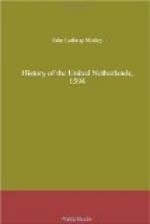from Mendoza but a disavowal of his former propositions.
But the shrewd Calvaert, who had entertained familiar
relations with La Varenne, received from that personage
after his return a very different account of his excursion
to the Escorial from the one generally circulated.
“Coming from Monceaus to Paris in his company,”
wrote Calvaert in a secret despatch to the States,
“I had the whole story from him. The chief
part of his negotiations with Don Bernardino de Mendoza
was that if his Majesty (the French king) would abandon
the Queen of England and your Highnesses (the States
of the Netherlands), there were no conditions that
would be refused the king, including the hand of the
Infanta, together with a good recompense for the kingdom
of Navarre. La Varenne maintained that the King
of Spain had caused these negotiations to be entered
upon at this time with him in the certain hope and
intention of a definite conclusion, alleging to me
many pertinent reasons, and among others that he,
having been lodged at Madrid, through the adroitness
of Don Bernardino, among all the agents of the League,
and hearing all their secrets and negotiations, had
never been discovered, but had always been supposed
to be one of the League himself. He said also
that he was well assured that the Infanta in her heart
had an affection for the French king, and notwithstanding
any resolutions that might be taken (to which I referred,
meaning the projects for bestowing her on the house
of Austria) that she with her father’s consent
or in case of his death would not fail to carry out
this marriage. You may from all this, even out
of the proposal for compensation for the kingdom of
Navarre (of which his Majesty also let out something
to me inadvertently); collect the reasons why such
feeble progress is made in so great an occasion as
now presents itself for a declaration of war and an
open alliance with your Highnesses. I shall
not fail to watch these events, even in case of the
progress of the said resolutions, notwithstanding
the effects of which it is my opinion that this secret
intrigue is not to be abandoned. To this end,
besides the good intelligence which one gets by means
of good friends, a continual and agreeable presentation
of oneself to his Majesty, in order to see and hear
everything, is necessary.”
Certainly, here were reasons more than sufficient
why Henry should be making but feeble preparations
for open war in alliance with England and the republic
against Philip, as such a step was hardly compatible
with the abandonment of England and the republic and
the espousal of Philip’s daughter—projects
which Henry’s commissioner had just been discussing
with Philip’s agent at Madrid and the Escorial.
Truly it was well for the republican envoy to watch
events as closely as possible, to make the most of
intelligence from his good friends, and to present
himself as frequently and as agreeably as possible
to his Majesty, that he might hear and see everything.
There was much to see and to hear, and it needed
adroitness and courage, not to slip or stumble in
such dark ways where the very ground seemed often to
be sliding from beneath the feet.




